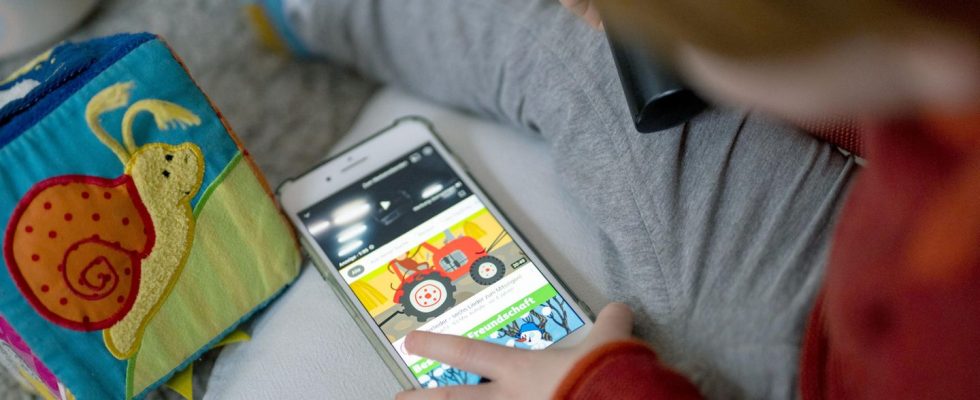Study on language acquisition
An hour of screen time a day causes toddlers to miss hundreds of words
In everyday stress, many parents like to put their small children in front of a smartphone or tablet. This can have consequences for language development, as researchers warn.
© Monika Skolimowska / DPA
Parking the child in front of the smartphone or tablet is not a good idea – at least when it comes to language acquisition. An investigation shows that this can slow it down.
Children learn from adults – this also applies to language development. If small children instead sit in front of the screen for a long time, many important moments of conversation are missed, warns an Australian research team. Because during the time they are on When they spend time on their smartphones, tablets or games consoles, they hear fewer words from their parents or other adults, interact less with them and notice fewer conversational processes. The language development based on this can be delayed, as the group explains in the specialist magazine “JAMA Pediatrics”..
Studies have already shown several times how important it is for a child’s language acquisition and socio-emotional development to be talked to and interacted with a lot in the home environment, the article says. In many cases, however, they focused on parents’ screen time and its consequences.
Limit smartphone and screen time for children
The group led by Mary Brushe from the School of Public Health at the University of Adelaide had now included data from 220 families collected using voice recognition technology every six months from January 2018 to December 2021. The screen time and home language environment of the 12 to 36-month-old children were recorded on an average 16-hour day.
World Children’s Day 2023
First smartphone, favorite activity and number of siblings: What you didn’t know about children before
The analysis showed that each increase in screen time was associated with a decrease in parent-child conversations. The children heard fewer words from the adults in their household, spoke less themselves and interacted less often in conversations. The largest declines per minute of screen time were observed at 36 months of age.
Even in families that adhere to the current World Health Organization (WHO) guidelines on screen time – one hour per day for three-year-olds – children can miss around 400 adult words per day, according to the study. However, it is estimated that the average screen time in most families is much higher.
When three-year-olds – as in the study – sit in front of screens for an average of 172 minutes a day, they miss an average of more than 1,000 words addressed to them from adults around them, as the researchers explain. However, it has not been investigated whether children who sit in front of screens for particularly long periods of time actually have a smaller vocabulary and poorer language skills.
“It is important for children’s language development in the first years to grow up in a linguistically rich home environment,” said the research team. This influences, among other things, school readiness and success throughout the rest of the education process.
“Talking to children appears to be a simple and straightforward activity,” the study also states. However, in the busy lives of families, this is often not so easy. It is unrealistic for families to completely stop using their smartphones or tablets to keep small children busy. “Instead, programs and policies could focus on encouraging families to use screen time as an opportunity to interact with their child,” the researchers said.


